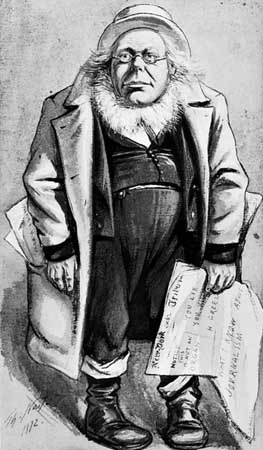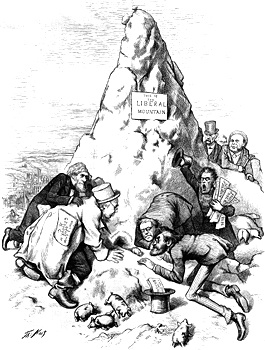Greeley, Horace
American journalist
born February 3, 1811, Amherst, New Hampshire, U.S.
died November 29, 1872, New York, New York
 American newspaper editor who is known especially for his vigorous articulation of the North's antislavery sentiments during the 1850s.
American newspaper editor who is known especially for his vigorous articulation of the North's antislavery sentiments during the 1850s.Greeley was a printer's apprentice in East Poultney, Vermont, until moving to New York City in 1831, where he eventually became a founding editor of a new literary paper, The New-Yorker (1834). A liberal Whig (Whig Party), Greeley caught the attention of New York political boss Thurlow Weed (Weed, Thurlow) and was asked to issue political campaign weeklies during the elections of 1838 and 1840. These publications substantially aided the Whig cause and marked the beginning of Greeley's political partnership with Weed and New York Governor William H. Seward (Seward, William H) (U.S. secretary of state, 1861–69)—a partnership that lasted until 1854.
Greeley's journalistic success encouraged him to embark on a more ambitious newspaper venture. The New York Tribune, which he founded in 1841 and edited until his death, became a daily Whig paper dedicated to a medley of reforms, economic progress, and the elevation of the masses. The Tribune set a particularly high standard in its news gathering, intellectual interest, and moral fervour. Greeley, who published a prodigious trove of cogent articles and editorials, came to be considered the outstanding newspaper editor of his time; his large and competent staff (which included European correspondence from Karl Marx (Marx, Karl) and Friedrich Engels (Engels, Friedrich), who wrote under Marx's name) cooperated to make the paper a political bible for many readers throughout the North. Reflecting his highly moral New England upbringing, Greeley was an unrelenting foe of liquor, tobacco, gambling, prostitution, and capital punishment. He became, in the words of Harper's Weekly (1869), “the most perfect Yankee the country has ever produced.” Because of Greeley's eclectic interests, many causes found a voice in the pages of the Tribune. While The New York Times cultivated a sober tone of moderation, and the New York Herald was jingoistic and often pro-business and pro-South, the Tribune defied categorization, promoting a wide variety of interests and causes. Greeley urged a number of educational reforms, especially free common-school education for all; he championed producers' cooperatives but opposed woman suffrage. He also pushed for Western expansion but did not coin, as commonly claimed, the famous phrase “Go West, young man.” (See Researcher's Note.)
 In the early 1850s Greeley became increasingly bitter over the failure of his Whig colleagues to support him for high public office—a lifelong ambition. He also grew disenchanted with the party's ambivalence toward slavery, which he opposed on both moral and economic grounds. In 1854 he transferred his allegiance to the newly emerging Republican Party, which he helped organize. Throughout the decade Greeley's newspaper fed the rising antislavery persuasion of the North. His editorial columns consistently opposed any compromise on the slavery issue as he argued against popular sovereignty (local option) in the territories, called for unrestricted free speech and mail privileges for abolitionists, encouraged Free-Soilers (Free-Soil Party) (who opposed slavery in the Kansas Territory), and advocated forcible resistance to federal fugitive-slave hunters.
In the early 1850s Greeley became increasingly bitter over the failure of his Whig colleagues to support him for high public office—a lifelong ambition. He also grew disenchanted with the party's ambivalence toward slavery, which he opposed on both moral and economic grounds. In 1854 he transferred his allegiance to the newly emerging Republican Party, which he helped organize. Throughout the decade Greeley's newspaper fed the rising antislavery persuasion of the North. His editorial columns consistently opposed any compromise on the slavery issue as he argued against popular sovereignty (local option) in the territories, called for unrestricted free speech and mail privileges for abolitionists, encouraged Free-Soilers (Free-Soil Party) (who opposed slavery in the Kansas Territory), and advocated forcible resistance to federal fugitive-slave hunters.After the onset of the Civil War (1861), Greeley pursued an erratic course, though generally he sided with the Radical Republicans (Radical Republican) in advocating early emancipation of the slaves and, later, civil rights for freedmen (Freedmen's Bureau).
Greeley lost much public respect by opposing Lincoln's renomination in 1864 and by signing the bail bond of former Confederate president Jefferson Davis (Davis, Jefferson) in 1867.
 Partly out of political pique and partly from disagreement with the corruption apparent in the first administration of President Ulysses S. Grant (Grant, Ulysses S.) (1869–73), Greeley joined a group of Republican dissenters, forming the Liberal Republican Party. The party opposed Grant in 1872 and nominated Greeley for president. In the dreary campaign that followed, he was so mercilessly attacked that, as he said, he scarcely knew whether he was running for the presidency or the penitentiary. Despite the faction's inexperience, Greeley polled more than 40 percent of the popular vote, but he died before the electoral college met, and his 86 electoral votes went to four minor candidates.
Partly out of political pique and partly from disagreement with the corruption apparent in the first administration of President Ulysses S. Grant (Grant, Ulysses S.) (1869–73), Greeley joined a group of Republican dissenters, forming the Liberal Republican Party. The party opposed Grant in 1872 and nominated Greeley for president. In the dreary campaign that followed, he was so mercilessly attacked that, as he said, he scarcely knew whether he was running for the presidency or the penitentiary. Despite the faction's inexperience, Greeley polled more than 40 percent of the popular vote, but he died before the electoral college met, and his 86 electoral votes went to four minor candidates.Additional Reading
An authoritative biography is Glyndon G. Van Deusen, Horace Greeley: Nineteenth-Century Crusader (1953, reissued 1967). Erik S. Lunde, Horace Greeley (1981), discusses his ideas.
- Humboldt, Alexander von
- Humboldt Glacier
- Humboldt River
- Humboldt University of Berlin
- Humboldt, Wilhelm, Baron von
- Hume, Alexander
- Hume, Allan Octavian
- Hume Cronyn
- Hume, David
- Hume, Hamilton
- Hume, John
- Hume, Joseph
- Hume Reservoir
- Hume-Rothery, William
- humerus
- Hume, Sir Patrick, 2nd Baronet
- Humfrey, Pelham
- Humfry Payne
- humic acid
- humidity
- humite
- Hummel, Johann Nepomuk
- hummingbird
- humoresque
- humour